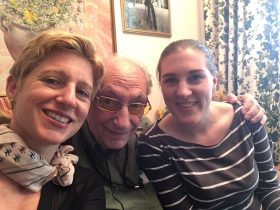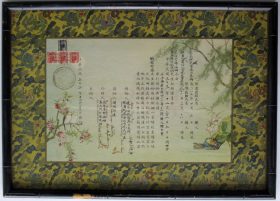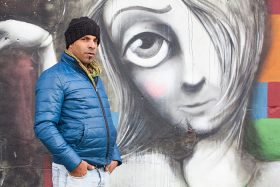The first entry in the series “Memories from the Life of Walter Frankenstein”

Walter Frankenstein with Anna Rosemann and Theresia Ziehe in Stockholm, 2017, Photo: Theresia Ziehe
I first had the pleasure of meeting Walter and Leonie Frankenstein in Stockholm in 2008. Back then, our meeting and the couple’s heartfelt partnership left a lasting impression on me. After 66 years of marriage, the Frankensteins still radiated love and a deeply held respect for each other. The author Klaus Hillenbrand, who tells the Frankenstein’s life story in Nicht mit uns (Not with Us), sums up this impression at the end of his book with a question he asks the couple: “Does ideal love exist?” Leonie looks at Walter. And Walter looks at Leonie. And then they give the shortest possible answer, as if speaking from one mouth: “Yes!”
→ continue reading
– How Jewish Memory Objects Preserve Chinese History

Chinese marriage certificate for Irma Bielschowsky (1902–2000) and Albert Elias Less (1887–1952), 1944; Jewish Museum Berlin, gift of Gert and Brigitte Stroetzel
I recently shared my view on several objects from Shanghai in the museum’s collection on this blog. Now, I want to draw your attention to a few marriage certificates that caught my eye not just because of their elegant design and well-preserved condition after more than 70 years, but also because I was amazed how Chinese cultural elements had entered and influenced the life of Jews who fled the Nazi rule, even though the Jews largely maintained their own cultural and educational activities in Shanghai with newspapers, Jewish schools, concerts, sport activities, theaters (e.g. Delila, Nathan der Weise, etc.), and parties (e.g. a not so sober celebration of Purim). → continue reading
Three Question for Anthropologists Dr. Dani Kranz and Katja Harbi

Photo: Katja Harbi
Our Academy programs regularly introduce new scholarship examining contemporary issues of migration and diversity. On May 4, University of Wuppertal anthropologists Dr. Dani Kranz and Katja Harbi will be presenting the results of the study they conducted, entitled Israeli Migration to Germany since 1990, with a lecture and show of photographs at the Jewish Museum Berlin. The research was largely about these immigrants’ identities and the significance of the Shoah for their lives in Germany, as well as the political and ideological debates occurring around them in Israel and Germany. We put three questions to the two anthropologists in advance of their presentation: → continue reading


